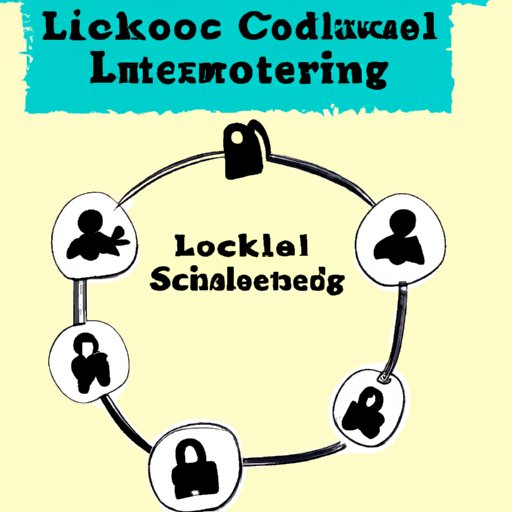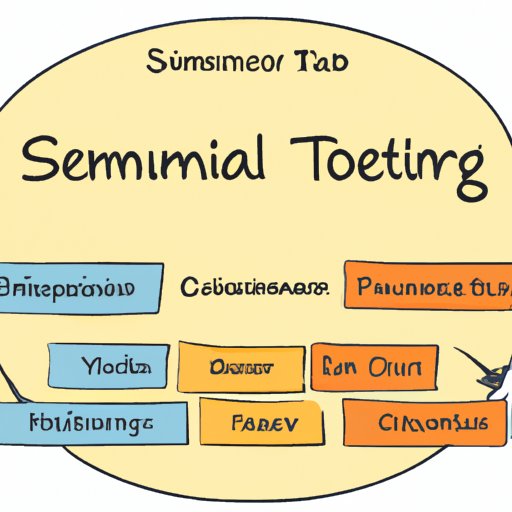I. Introduction
A traditional classroom setting involves a teacher lecturing and students listening passively, with little student interaction. While this method is still prevalent, it has been increasingly recognized that it does not provide students with opportunities to think critically or collaborate with their peers. Inquiry-based learning is a more progressive, learner-focused approach, and the Socratic seminar is one technique used for effective inquiry-based learning. In this article, we will explore the art of inquiry, specifically the Socratic seminar, how it works, and its benefits.
II. The Art of Inquiry: A Guide to Socratic Seminars
Inquiry-based learning involves an open-minded approach to learning, with students taking ownership of their learning, exploring new ideas, and mastering concepts through questioning and hands-on experience. The Socratic seminar is an ideal tool to promote this approach to learning. Socratic seminars are text-based, student-driven discussions that encourage participants to challenge their assumptions and explore complex ideas.
This method of inquiry-based learning works by presenting students with a text or a series of texts, such as excerpts from a novel or historical documents, and asking them to actively read and analyze the text before the discussion. The seminar is then conducted with the teacher acting as a facilitator, rather than a lecturer. During the seminar, students are encouraged to question the text and each other, seeking deeper understanding and insights. They should consider viewpoints that they might not have considered before, identify structures or patterns in the text, and look for connections between ideas.
A successful Socratic seminar involves a series of steps. First, the teacher should choose a text that is rich with meaning and complexity. Next, the students should be provided with clear instructions on how to prepare for the seminar, such as reading the text or taking notes on significant passages. During the discussion, the teacher should have a clear plan for guiding the conversation, allowing it to be student-led and ensuring that everyone has the opportunity to participate. Finally, the teacher should debrief the discussion with the students, allowing them to reflect on what they learned and how they can apply their insights to future learning activities.

III. Unlocking Collaborative Learning: How Socratic Seminars Foster Critical Thinking
One of the crucial components of Socratic seminars is their emphasis on collaborative learning. In a traditional classroom, students often work independently, listening to a lecture or working on a project. Socratic seminars, on the other hand, require students to work together, exploring complex ideas and synthesizing new insights. By working together, students can challenge each other, broaden their thinking, and develop critical thinking skills that they would not have developed in isolation.
Collaborative learning is essential for deepening students’ critical thinking abilities, as it allows them to explore issues from a variety of perspectives. Socratic seminars foster critical thinking by requiring students to ask and address difficult questions, provide evidence to support their ideas, and evaluate the viewpoints of others. This process encourages students to think more deeply, to be more analytical, and develop their ability to form independent opinions based on evidence.
Socratic seminars can be used in a variety of subjects, from literature to social studies to science. They can be used to reinforce reading comprehension skills or to explore complex historical or social topics. They can also be used to help students develop research skills, debate skills, and critical thinking skills that are universally applicable.
IV. Why Socratic Seminars are the Future of Classroom Discussions
Traditional classroom discussions often fall short because they do not encourage meaningful dialogue or collaboration. They are often led by the teacher, with students taking a backseat to the lecture. Socratic seminars, on the other hand, are student-centered, requiring participants to take an active role in the discussion.
Socratic seminars have several benefits over traditional classroom discussions. For one, they provide students with meaningful opportunities to engage with complex ideas and to practice their critical thinking and collaboration skills. They also promote a more supportive, student-driven environment, where participants feel heard and empowered to express their opinions.
The growing popularity of Socratic seminars is attributed to several factors. One of the main reasons is their effectiveness at enhancing students’ critical thinking and collaboration skills. They are also valued for their ability to increase student engagement and participation in the discussion, providing students with a sense of ownership over their learning.
V. Socratic Seminars 101: A Primer on Structured, Stimulating Discussions
To conduct a successful Socratic seminar, it is crucial to structure the discussion. The following are three key elements of an effective Socratic seminar:
1. Clear expectations: Begin by explaining your expectations for the discussion. Make it clear that the seminar is a student-led discussion, and that everyone is expected to share their perspectives. Provide clear guidance on what is expected of participants, such as asking open-ended questions and providing evidence to support their ideas.
2. A structured approach: Provide a clear structure for the discussion. Start by asking a broad, open-ended question to start the conversation, and then build on the discussion using follow-up questions. Encourage participants to respond to each other, building on each other’s ideas, and asking clarifying questions as necessary.
3. A focus on inquiry: Socratic seminars are designed to encourage inquiry-based learning. Encourage participants to ask questions and explore new ideas, promoting self-directed, interactive learning.
To keep the discussion stimulating, it is important to encourage participants to ask and respond to challenging questions. You can also create a supportive, collaborative environment by encouraging students to work together, providing positive feedback, and demonstrating how to ask open-ended questions.
Common pitfalls to avoid during Socratic seminars include dominating the discussion, having unclear expectations, and focusing too much on the teacher’s agenda, rather than the students’ perspectives.
VI. Mastering the Socratic Seminar: Tips and Strategies for Engaging Classroom Conversations
To be an effective seminar leader, it is crucial to use a number of tips and strategies. One of the key strategies is to start by laying out clear expectations for the discussion, including the rules of engagement, the structure, and the focus on inquiry.
Other tips for engaging in classroom conversations include:
1. Developing an open mindset: Be open to a range of perspectives, and encourage participants to challenge their assumptions and consider new ideas. Encourage students to go beyond simple summaries and interpretations, and to think critically about the text.
2. Asking open-ended questions: Encourage participants to ask open-ended questions, digging deeper into the text and exploring different perspectives. Provide guidance on how to ask open-ended questions, such as asking “why” or “how” questions.
3. Encouraging sustained engagement: Encourage participants to engage in sustained conversation, going beyond yes/no responses or simple summaries. Encourage them to provide in-depth evidence to support their claims, and to engage in active listening, building on each other’s ideas.
Demonstrating these skills can help keep the discussion focused, engaging, and productive. Additionally, by modeling these skills, you can help students develop their critical thinking and collaboration abilities.
VII. From Socrates to the Classroom: A Brief History of Socratic Seminars
Socratic seminars have roots in the Socratic method, which involves a dialogue between two or more individuals, with one person asking questions and the other answering. This method was developed by ancient Greek philosopher Socrates, who believed that knowledge was found through questioning and discussion.
The Socratic seminar was developed for the classroom by educator Leland S. McCleary in the 1960s. Since then, Socratic seminars have evolved to include a range of techniques, but the key elements of open-ended questioning, inquiry-based learning, student-led dialogue, and collaboration have remained central to the seminar’s success.
Today, Socratic seminars are gaining popularity as a tool for fostering critical thinking, collaboration, soft skills, and student engagement. From their ancient origins to the modern classroom, Socratic seminars have proven to be a powerful tool for promoting deep thinking and meaningful discussion in a range of subjects.
VIII. Why Socratic Seminars are Vital to Developing Essential Soft Skills
In today’s global economy, soft skills, including communication, collaboration, and critical thinking, are essential for success. Socratic seminars are a powerful tool for developing these skills, as they encourage participants to think critically and collaborate with their peers.
During Socratic seminars, participants are encouraged to listen to each other, to ask meaningful questions, and to build on each other’s ideas. They are also asked to provide evidence to support their ideas and to evaluate the viewpoints of others. These skills are not only important for academic success but also for success in the workplace and the community.
Studies have shown that students who participate in Socratic seminars develop better communication, collaboration, and critical thinking skills than their peers who do not participate in such activities. Additionally, these skills are transferable and applicable to a range of contexts, from group projects to team-building activities in the workplace.
IX. Conclusion
Socratic seminars are a powerful tool for promoting inquiry-based learning, collaborative learning, critical thinking, and soft skills development. By fostering deep thinking and meaningful discussion, Socratic seminars can help students develop the skills they need for success in school, the workplace, and everyday life.
To implement Socratic seminars effectively, it is important to structure the discussion and provide clear expectations for participants. Seminar leaders should encourage open-ended questioning, sustained engagement, and a culture of inquiry. By modeling these skills and encouraging students to participate, seminar leaders can help students develop their critical thinking, communication, and collaboration abilities.
Whether we are looking to enhance our teaching abilities or are simply looking for ways to promote inquiry-based learning, Socratic seminars provide a powerful tool for promoting deep thinking and meaningful dialogue. By incorporating Socratic seminars into our teaching repertoire, we can help our students engage with complex ideas, develop their critical thinking skills, and build lasting skills for success.
